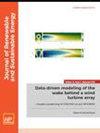Optimization tool for operating isolated diesel-photovoltaic-battery hybrid power systems using day-ahead power forecasts
IF 1.9
4区 工程技术
Q4 ENERGY & FUELS
引用次数: 0
Abstract
This paper presents a computational tool based on a genetic algorithm and artificial neural network for optimizing the operation of isolated diesel-photovoltaic-battery hybrid power systems using day-ahead power forecasts obtained with quantile random forests. The optimization tool was conceived to be flexible, i.e., it can be used to operate isolated power systems with multiple configurations of diesel generator sets (DGS), to work with a reduced number of input data, and to be as simple as possible to be used. The optimization relies on combining valley-filling and peak-shaving strategies using battery energy storage systems while considering the combined forecast of demand and photovoltaic (PV) generation. The tool also simulates the behavior of the DGS to define the optimum arrangement of diesel generators considering the variability of both demand and PV generation. The output consists of hourly values of energy storage power dispatch, DGS arrangement, and, if necessary, load shedding and/or PV curtailment. The algorithm that implements the optimization tool, which is currently in the phase of field-test in the isolated diesel-photovoltaic-battery hybrid power system of Fernando de Noronha, Brazil, demonstrated a good performance in computer simulations validated with real measured data.使用日前功率预测运行隔离柴油-光伏电池混合动力系统的优化工具
本文提出了一种基于遗传算法和人工神经网络的计算工具,用于利用分位数随机森林获得的日前功率预测来优化孤立型柴油-光伏-电池混合动力系统的运行。优化工具被认为是灵活的,即它可以用于运行具有多种配置的柴油发电机组(DGS)的隔离电力系统,减少输入数据的数量,并且使用起来尽可能简单。在考虑需求和光伏发电组合预测的同时,利用电池储能系统将填谷和调峰策略结合起来进行优化。该工具还模拟了DGS的行为,以确定考虑需求和光伏发电的可变性的柴油发电机的最佳配置。输出包括储能功率调度、DGS安排以及必要时的减载和/或光伏弃风的小时值。实现优化工具的算法目前正在巴西Fernando de Noronha的孤立柴油-光伏-电池混合动力系统中进行现场测试,在计算机模拟中显示出良好的性能,并得到了实际测量数据的验证。
本文章由计算机程序翻译,如有差异,请以英文原文为准。
求助全文
约1分钟内获得全文
求助全文
来源期刊

Journal of Renewable and Sustainable Energy
ENERGY & FUELS-ENERGY & FUELS
CiteScore
4.30
自引率
12.00%
发文量
122
审稿时长
4.2 months
期刊介绍:
The Journal of Renewable and Sustainable Energy (JRSE) is an interdisciplinary, peer-reviewed journal covering all areas of renewable and sustainable energy relevant to the physical science and engineering communities. The interdisciplinary approach of the publication ensures that the editors draw from researchers worldwide in a diverse range of fields.
Topics covered include:
Renewable energy economics and policy
Renewable energy resource assessment
Solar energy: photovoltaics, solar thermal energy, solar energy for fuels
Wind energy: wind farms, rotors and blades, on- and offshore wind conditions, aerodynamics, fluid dynamics
Bioenergy: biofuels, biomass conversion, artificial photosynthesis
Distributed energy generation: rooftop PV, distributed fuel cells, distributed wind, micro-hydrogen power generation
Power distribution & systems modeling: power electronics and controls, smart grid
Energy efficient buildings: smart windows, PV, wind, power management
Energy conversion: flexoelectric, piezoelectric, thermoelectric, other technologies
Energy storage: batteries, supercapacitors, hydrogen storage, other fuels
Fuel cells: proton exchange membrane cells, solid oxide cells, hybrid fuel cells, other
Marine and hydroelectric energy: dams, tides, waves, other
Transportation: alternative vehicle technologies, plug-in technologies, other
Geothermal energy
 求助内容:
求助内容: 应助结果提醒方式:
应助结果提醒方式:


